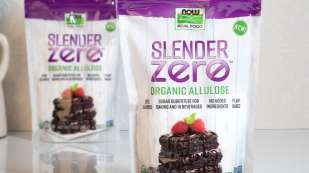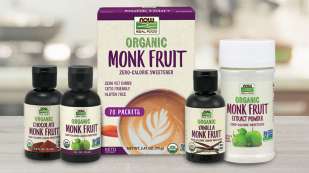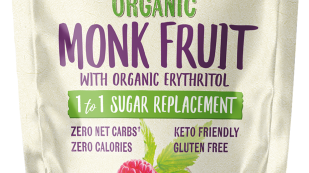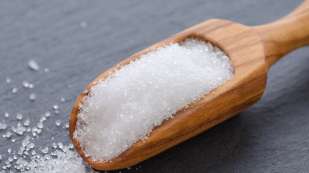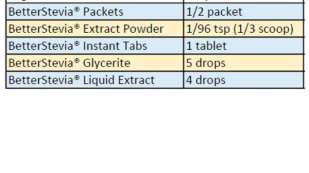Use coupon code MOISTURIZER with your purchase of $40 or more for a free†
Blemish Clear MoisturizerErythritol FAQs

What is Erythritol?
Erythritol is a type of carbohydrate called a ‘sugar alcohol’ that is used as a sugar substitute.
How does a ‘sugar alcohol’ compare with alcohol?
“Although they share a similar name, sugar alcohol and alcoholic beverages do not have the same chemical structure. Sugar alcohol does not contain ethanol, which is found in alcoholic beverages.” (Yale New Haven Hospital)
Is Erythritol an ‘artificial sweetener’?
Erythritol is not typically classified as an artificial sweetener. The FDA does not include it in its list of high-intensity sweeteners approved as food additives.
Is Erythritol ‘natural’?
Erythritol is naturally found in some fruits and mushrooms. It can also be produced when fermenting foods like cheese, wine and beer.
Erythritol is also produced in our bodies during normal glucose metabolism via the pentose phosphate pathway.
NOW’s Erythritol is produced in a fermentation process from non-GMO dextrose. There is no official definition of ‘natural’ in federal regulations.
Have regulatory authorities approved Erythritol for human consumption as a food?
Yes, the World Health Organization (WHO) approved erythritol in 1999 and the U.S. Food and Drug Administration (FDA) approved it in 2001.
Erythritol has been on the U.S. FDA GRAS (Generally Recognized as Safe) Inventory since 2001.
Subsequent GRAS notices have been issued by FDA for which the agency has no questions about the GRAS determination for erythritol in its response letters to the applicants.
How is Erythritol metabolized differently than traditional sugar?
The FDA reports that "Sugar alcohols are slightly lower in calories than traditional sugar and do not promote tooth decay or cause a sudden increase in blood glucose."
FDA: “The majority of erythritol cannot be metabolized by the human body and is excreted unmodified into the urine without changing blood glucose and insulin levels...”
FDA: “It also means that a severe disadvantage of other polyols, namely sorbitol and xylitol, leading to diarrhea is eliminated...”
FDA: “Erythritol is also a free radical scavenger with the ability to potentially exercise its … activity while circulating the body before it is excreted into the urine…”
What does the scientific community say about the safety of erythritol?
GRAS notices indicate no significant safety issues in animals and humans. One GRAS panel further concluded that erythritol is well-tolerated by humans and produces no meaningful gastrointestinal or renal effects when ingested with food and beverages at levels providing up to one gram per kilogram body weight per day (g/kg/day), corresponding to a daily intake of 60 g/day (i.e., for a 60 kg adult).
Erythritol was reviewed by the Joint WHO/FAO Expert Committee on Food Additives (JECFA), and it was assigned an ADI (Acceptable Daily Intake) of "not specified," which is the highest safety rating that JECFA can give to a food additive. Gastrointestinal symptoms were the main adverse events observed in animal and human studies. JECFA found that the no-observed-effect levels (NOELs) for physiological responses to orally administered erythritol in animals were mostly between 1 and 2 g/kg/day.
Do Stevia sweeteners contain Erythritol?
Stevia itself, as an ingredient, does not contain erythritol.
Some brands of stevia products use erythritol as a bulking agent to make packets or powdered versions (typically not liquids) because stevia itself is a very concentrated sweetener used in tiny amounts.
NOW DOES NOT ADD ERYTHRITOL TO OUR STEVIA PRODUCTS, OR TO STEVIA USED AS A SWEETENER IN OTHER PRODUCTS. If a NOW product's label lists stevia as a sweetener, it will not contain erythritol unless erythritol is separately listed on our product label.
What NOW® products contain erythritol, and how much?
Erythritol bulk sweeteners in powder/granular forms (100% Erythritol products)
- 6902 Erythritol, Confectioners Powder
- 6921 Erythritol granules, organic
- 6927, 6923 Erythritol granules pure
Certain Monk Fruit Products
- 7124 Monk Fruit 1:1 Sugar Replacement Organic (4 grams per teaspoon)
- 7125 Monk Fruit Packets Organics (less than one gram per packet)
Other products
- 6681 Slender Hot Cocoa Mix (about 4 grams per serving)
- 2218 Organic Pea Protein Chocolate (140 mg per scoop)
- 0216 BCAA Blast Tropical Punch (about 4 grams per serving)
- 0218 BCAA Blast Raspberry (about 4 grams per serving)
- 0453 B-12 10,000 mcg liquid ‘shots’ (about 2 grams per serving)
- 8098 Activated Nasal Mist (not intended for ingesting/swallowing; about 3 grams per bottle)
What is the recent controversy about erythritol and health?
A report published online in Nature Medicine in 2023 examined clotting risk associated with erythritol blood levels in subjects being assessed for cardiovascular risk.
The same report cited research on 8 healthy subjects fed 30 grams of erythritol and found increased levels of plasma erythritol for about 2 days afterward, well above thresholds associated with heightened platelet reactivity and thrombosis potential in in vitro and animal studies.
The amount of erythritol used in NOW’s Monk Fruit products is less than one gram per packet; and 8 grams per 2-teaspoon serving of our Monk Fruit 1:1 Sugar Replacement Organic product.
The authors of the study that generated controversy about erythritol stated:
“In summary, the present studies suggest that trials investigating the impact of erythritol specifically, and artificial sweeteners in general, with appropriate duration of follow-up for clinically relevant outcomes, are needed. Following exposure to dietary erythritol, a prolonged period of potentially heightened thrombotic risk may occur. This is of concern given that the very subjects for whom artificial sweeteners are marketed (patients with diabetes, obesity, history of CVD and impaired kidney function) are those typically at higher risk for future CVD events.”
The authors also report, “Another limitation of our clinical observational studies is that by design, these studies can only show association and not causation.”
That said, people who have diabetes, obesity, cardiovascular disease, or kidney disorders should consult with their physicians regarding whether erythritol is advisable for their use. In addition, consult a physician about whether erythritol can be used at the same time as anticoagulant/anticlotting/“blood thinning” medications, the use of which are intended to counter clotting factors.
Comments:
It is important to note that the discovery and validation cohorts were not healthy populations (average ages were respectively 65, 62.9 and 75, mainly obese men (BMI>25); >20% were diabetics, >70% had high blood pressure, >69% had known coronary heart disease, and the U.S. and discovery cohorts had low HDL). Therefore, the results of the cohort study should not be applied to a healthy population.
Because erythritol is normally produced internally in humans from blood sugar, there is no way to distinguish between the ingested erythritol and that produced in humans as a result of normal metabolism of other carbohydrates. There appears to be a relationship between circulating erythritol and cardiometabolic diseases previously observed in epidemiological studies. A plausible explanation for this is that plasma erythritol is a non-harmful biomarker resulting from glucose- or fructose-rich diets or conditions that increase or impair blood sugar. However, this has not been confirmed in clinical trials. In contrast to the 2023 Nature Medicine article, the same year, a clinical study published in BMJ Nutrition, Prevention & Health showed that supplementing the diet with 36 g a day of erythritol for 5 weeks had no effect on arterial stiffness, suggesting that erythritol does not affect the structure and function arterial wall. Furthermore, consumption of even high doses of erythritol (20-75 g) does not increase circulating glucose or insulin, and short-term clinical trials suggest that it promotes the release of satiety hormones in the gut. Limited data also indicate that it has no negative effects on HbA1c. Therefore, no firm conclusion regarding any negative cardiovascular health effects of erythritol can be drawn from the existing data.
References:
- WedMD - https://www.webmd.com/diet/what-is-erythritol
- Yale New Haven Hospital - https://www.ynhh.org/services/nutrition/sugar-alcohol#:~:text=Although%20they%20share%20a%20similar,is%20found%20in%20alcoholic%20beverages.
- FDA - https://www.fda.gov/food/food-additives-petitions/sugars-are-metabolized-differently-traditional-sugars
- Erythritol as sweetener—where from and where to? - https://www.ncbi.nlm.nih.gov/pmc/articles/PMC5756564/
- Witkowski, M., Nemet, I., Alamri, H. et al. The artificial sweetener erythritol and cardiovascular event risk. Nat Med (2023) - https://doi.org/10.1038/s41591-023-02223-9
- Noda, K.; Nakayama, K.; Oku, T. Eur. J. Clin. Nutr. 1994, 48, 286–292.
- Wölnerhanssen, B.K.; Drewe, J.; Verbeure, W.; le Roux, C.W.; Dellatorre-Teixeira, L.; Rehfeld, J.F.; Holst, J.J.; Hartmann, B.; Tack, J.; Peterli, R. Diabetes Obes. Metab. 2021, 23, 1311–1321.
- Beglinger, C.; Meyer-Gerspach, A.C. Am. J. Physiol. Endocrinol. Metab 2016, 310, E1053–E1061.
- Ishikawa, M.; Miyashita, M.; Kawashima, Y.; Nakamura, T.; Saitou, N. Regul. Toxicol. Pharmacol. 1996, 24, S303–S308.
- Chukwuma, C.I.; Mopuri, R.; Nagiah, S.; Chuturgoon, A.A.; Islam, M.S. Eur. J. Nutr 2018, 57, 2431–2444.
- Livesey, G. Nutr. Res. Rev. 2003, 16, 163–191.
- Wen, H.; Tang, B.; Stewart, A.J.; Tao, Y.; Shao, Y.; Cui, Y.; Yue, H.; Pei, J.; Liu, Z.; Mei, L.; et al. J. Agric. Food Chem. 2018, 66, 1401–1407.
- Flint, N.; Hamburg, N.M.; Holbrook, M.; Dorsey, P.G.; LeLeiko, R.M.; Berger, A.; de Cock, P.; Bosscher, D.; Vita, J.A. Acta Diabetol. 2014, 51, 513–516.
- Yokozawa T, Kim HY, Cho EJ. J Agric Food Chem 2002; 50:5485–9.
- den Hartog GJ, Boots AW, Adam-Perrot A, Brouns F, Verkooijen IW, Weseler AR, Haenen GR, Bast A. Nutrition. 2010 Apr 1;26(4):449-58.
- Jin M, Wei Y, Yu H, Ma X, Yan S, Zhao L, Ding L, Cheng J, Feng H. J Agric Food Chem. 2021 Nov 10;69(44):13080-13092.


